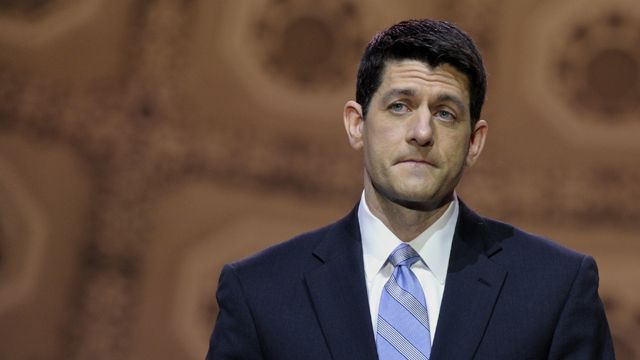
Our political class is feuding about whether Rep. Paul Ryan is a racist. Rather than fearing that this donnybrook degrades political discourse, we should welcome it.
Ryan sparked the controversy when he blamed poverty on “a tailspin of culture” in our “inner cities,” while invoking for support Charles Murray, notorious for postulating the genetic inferiority of blacks. Within hours, Rep. Barbara Lee rebuked Ryan for launching “a thinly veiled racial attack.”
Other critics immediately piled on, with a Politico piece appearing under the title “Is Paul Ryan Racist?” and Paul Krugman in The New York Times calling out Ryan for racial dog whistling. But hitting back, National Review editor Richard Lowry slammed Ryan’s critics for trying to drape him with the Klan’s white hood and The Wall Street Journal’s editorial page fumed, “Republicans are accused of racism if they ignore the least fortunate, and now they’re racist for taking poverty and its causes seriously.”
Let me come clean: I wrote Politico’s “Is Paul Ryan Racist?” piece, so I’m hardly impartial. But there are also a couple of ironies behind that title that directly demonstrate why we should welcome the row over whether Ryan is racist.
A day after Ryan’s remarks, a Politico editor solicited my thoughts, likely because I’ve recently published a book on race baiting in contemporary politics. My initial response seemed to cause consternation, however, for I proposed to argue that Ryan was being “racist” — and then to explain that racism takes various forms. More on that later. Here, the important point is that the editor balked, asking for a piece that was more “nuanced.”
The first irony is that I had nuance precisely in mind. A simplistic understanding of racism hamstrings our national conversation: for most people, a racist must resemble the invective-spewing cross burner, or a skinhead with a swastika tattooed on his face. The basic defense of Ryan rests on this pinched conception of racism: he cannot possibly be racist because he does not wear a white hood, nor does he possess, The Wall Street Journal assures us, “imagined neo-Confederate sympathies.”
But racism comes in many forms. In addition to malicious bigotry, unconscious biases operate powerfully in our society. Indeed, the potency of Ryan’s words largely reflects the subterranean power of stereotypes.
Basic facts belie the claim that poverty stems principally from a cultural deficit among urban minorities: poverty is far more prevalent in rural areas; and declining real wages have impoverished a broad cross section of the middle and working class. Blaming poverty on poor nonwhites is absurd — but it gains traction through deeply rooted beliefs in their shiftless laziness.
Here’s the second irony with the title: I ultimately acquiesced to providing a sanitized op-ed that avoided connecting Ryan’s actions to “racism,” only to have Politico entitle the piece “Is Paul Ryan Racist?” Even as I was discouraged from treating the question seriously in the text, the journal deployed the possibility of racism in the headline as a goad to drive readership.
Possible racism on Ryan’s part should not be treated as a throwaway provocation; rather, it deserves sober thought.
I strongly doubt that Ryan is a Klan-style bigot; today, very few people are. Nor am I overly concerned with whether Ryan, like most of us, is plagued by racial stereotypes buried deep in his psyche.
My greatest fear is that Ryan shares with the Republican Party a penchant for strategic racism — a willingness to stir widespread racial anxiety in pursuit of votes. This is not racism as hate, or as bias, but as the cold, calculating decision to exploit racist sentiments in society.
In 1963, Republican leaders fatefully decided to seek advantage in the rising backlash to the civil rights movement. After attending a meeting of the Republican National Committee, Robert Novak reported: “A good many, perhaps a majority of the party’s leadership, envision substantial political gold to be mined in the racial crisis by becoming in fact, though not in name, the White Man’s Party.”
Malice did not drive this; instead, it reflected a tactical decision to stoke racial fears. And this strategy has largely worked. After 1964, Republican presidential candidates have won a majority of the white vote in every election, often by staggering margins. Today, the centrality of race to the GOP is obvious: roughly 9 out 10 Republican supporters are white, as are 98 percent of its elected state officials.
Why so little attention to this discouraging reality? Partly, its because our understanding of racism remains truncated. Defining racism exclusively as hate works for the defenders of today’s political order. It allows them to denounce any criticism as resting on ridiculous charges of personal bigotry.
Meanwhile, critics themselves often proceed under a constrained conception of racism: when they search today’s politics for malice toward minorities, they conclude that this plays little or no role and then too quickly abandon all racial analysis.
To really understand how race skews American politics today, we need a robust discussion of the many forms that racism takes, including racism as bigotry, as unconscious bias, and as strategy. And that means that arguing about whether Paul Ryan is a racist is a very good thing.


